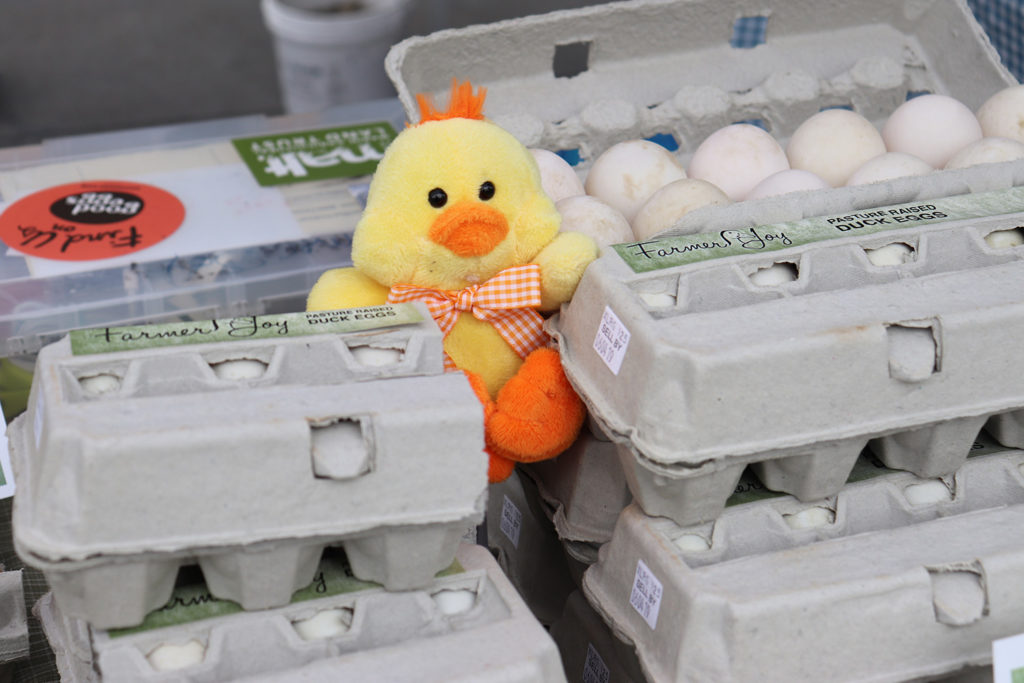The Joys (and Challenges) of Humane Farming
Savannah Kuang, CUESA Staff
February 13, 2020

“We always say we raise our animals with love because we really do love them,” says Joy Dolcini of Farmer Joy, a sixth-generation family farm in Chileno Valley. “We just want to make sure they’re happy and healthy, which makes love the secret ingredient in our eggs and meat.”
For Joy, love means raising all of her animals humanely on green pastures. Joy and her family began by raising cattle and pigs to produce their own meat, and eventually started selling it to local businesses in 2018. “It certainly wasn’t my intention to start a business, but it was just a nice way for me to be able to stay home with the kids and make a little money for groceries or other necessities by selling these products,” she says.

The Chicken or the Egg?
Joy’s children wanted chickens and started raising them, resulting in an abundance of laid eggs. She started selling them at their preschool and eventually made it an actual business. “It was mostly for fun at the time,” she says. “But it got to the point where I was selling all of the eggs, and we had to buy our own at the grocery store. That got us to buy even more chickens and that process just repeated itself. That turned out to be the majority of our business.”
The farm’s animals roam freely in the pastures, while foraging on grass and feed in the barn. “We feed them a variety of foods, such as natural grains for the chickens and ducks, as well as vegetables,” says Joy. Their pigs also eat grains and vegetables, while their cows are fully grass-fed.

The Meaty Challenge
But being a small rancher dedicated to humane farming also comes with many hurdles, and right now Farmer Joy is faced with a challenge that impacts her farm and other local farmers, too. As of January, the local facility where she takes her animals for processing is no longer accepting animals from other local farmers.
In 2014, the meat company Marin Sun Farms bought the Bay Area’s last remaining slaughterhouse to support their own business and other ranchers with processing, including livestock hauling, slaughtering, cutting to meat packaging, distribution, and sales. But due to staffing, they have had to scale back to focus on their own product.
With Marin Sun Farms closing its doors to other ranchers, Farmer Joy will have to travel further to find another USDA-approved facility in the Central Valley or up north by Humboldt County. “It’s not easy to find alternative slaughterhouses,” says Joy. “There’s going to be an influx of other farmers trying to get the same spots at these local slaughterhouses.”

Fighting Consolidation
With just four corporations processing roughly 80% of U.S. beef, generally serving large CAFO (concentrated animal feeding operation) and factory farms, finding local slaughterhouses presents a barrier for small-scale livestock producers dedicated to humane farming, transparency, and traceability.
Rancher Mark Pasternak of Devil’s Gulch Ranch, who also processed pigs with Marin Sun Farms, raises concerns about production costs and factory farm consolidation. In an article by the San Francisco Chronicle, he said the loss of the facility will not only impact his farmers markets and restaurant sales, but also animal welfare and the environment. Joy shares similar concerns. “Having to haul them even farther away is going to be more difficult for the animals,” she says.
Farmer Joy butchers an animal every eight weeks, which is a much smaller scale than large factory farms that transport whole trucks full of livestock. Large slaughterhouses are often reluctant to deal with smaller farmers who only bring a small number of animals, which means small farms sometimes need to team up.
“Our other challenge is going to be finding other small farmers who wouldn’t mind us bringing one of our animal with theirs,” says Joy. “I’m hoping that, once it gets to the slaughterhouses, everyone gets the right animals back.”

Supporting Local Ranchers
Despite the transportation challenges, Joy has a few processing facility options lined up, but she emphasizes how difficult keeping these relationships is in the long run. “These places don’t have unlimited slaughter space available, so it’s a matter of time getting on the waitlist,” she says. “It hasn’t happened yet, but I’m definitely nervous about trying to arrange that when the time comes.”
Joy also acknowledges that small farmers might need to price their products a bit higher than conventional factory-farmed meat due to higher costs of labor and resources that come with treating animals and soil better. “That money is going directly to support family farms rather than large corporations,” she says.
“We’re just a very small farm, and supporting us means we’re really able to concentrate on producing high-quality products. It’s all the profit we have right now, so it makes a big difference.”
Third and fifth photo courtesy of Farmer Joy.
Find Farmer Joy and Devil’s Gulch Ranch in the back plaza at the Ferry Plaza Farmers Market on Saturdays.
Topics: Animal welfare, Meat/poultry
